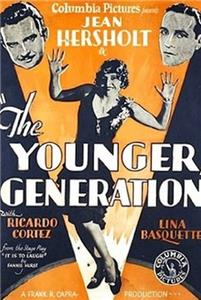The Younger Generation (1929) Online

Young Morris Goldfish follows his immigrant father into business. His ruthless business practices cause him to become a big success, and he moves the family to Park Avenue. They go, but were happier back on the East Side. Morris is ashamed of this parents and his humble origins, but learns in the end that there is more to life than money.
| Complete credited cast: | |||
| Jean Hersholt | - | Julius Goldfish - Pa | |
| Lina Basquette | - | Birdie Goldfish | |
| Ricardo Cortez | - | Morris Goldfish | |
| Rex Lease | - | Eddie Lesser | |
| Rosa Rosanova | - | Tilda Goldfish - Ma | |
| Syd Crossley | - | Goldfish's Butler (as Sid Crossley) | |
| Martha Franklin | - | Mrs. Lesser |
A print of this film survives in the Library of Congress.
This movie is based on a Fannie Hurst play, "It Is to Laugh," which opened at the Eltinge 42nd Street Theatre in New York City on 26 December 1926 and closed after 32 performances in January 1927.







User reviews